
6 Best Tools for Building Cross-Platform Mobile Apps
The demand for cross-platform mobile app platforms is rising at an unprecedented rate.
Search interest data for cross-platform software from Google Trends says the same.
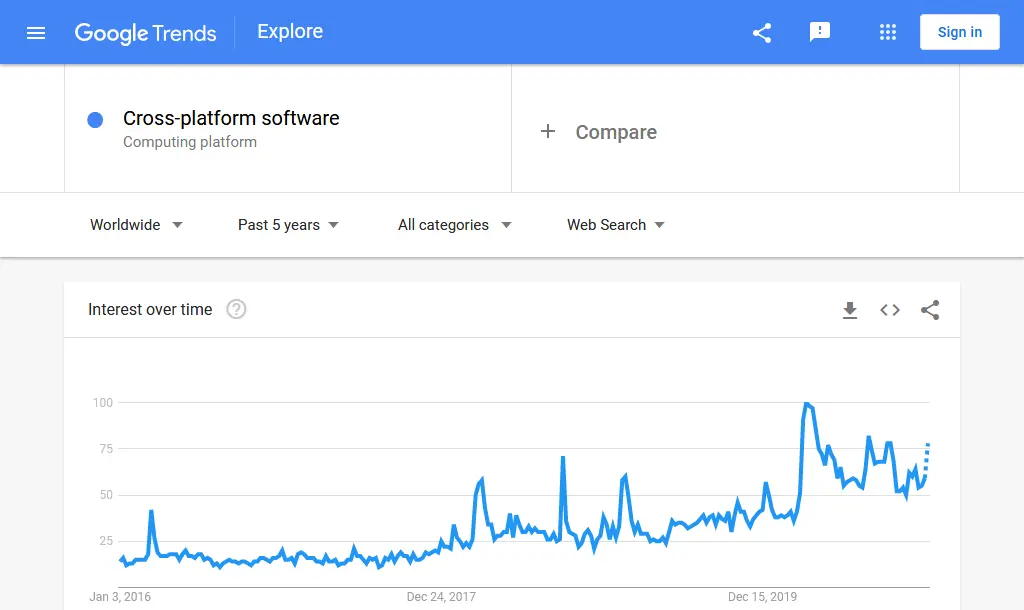
For app developers and freelance app builders, this is excellent news!
When built with a cross-platform app development tool, a mobile app would be compatible with multiple platforms (Android, iOS, Windows, etc.).
Furthermore, app-building companies and freelancers would be able to release apps much faster. That means greater revenue in a shorter time. However, there is a catch.
Not all such tools are suitable for all app developers. You would need to know which one is the best fit for you.
In this discussion, we will talk about six cross-platform mobile app builders. Do stick with me. You may find one that would help unleash your creativity and skill.
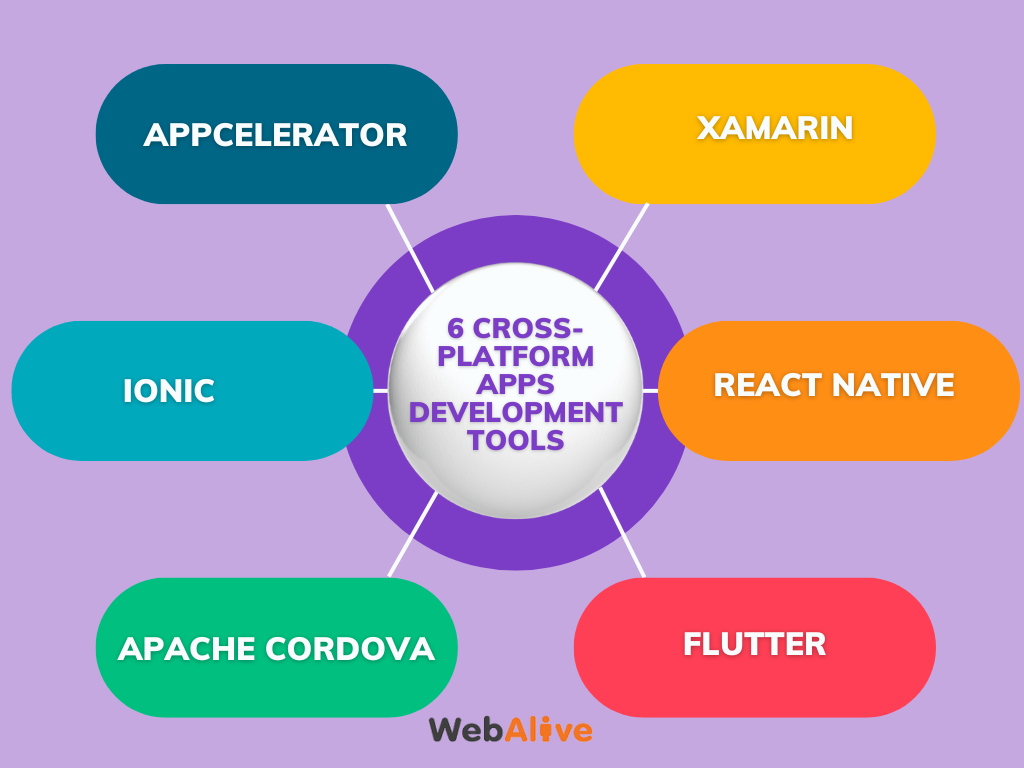
A heads up for you
Before we dive into the meat of the discussion, I should inform you about something.
I am going to use the following format to talk about each of the six app builders:
- Introductory sentences
- Search interest data from Google Trends
- Pros
- Cons
- Rating by developers
- Link to the platform website
Let us begin.
1. Xamarin-A .NET and C# based open-source tool
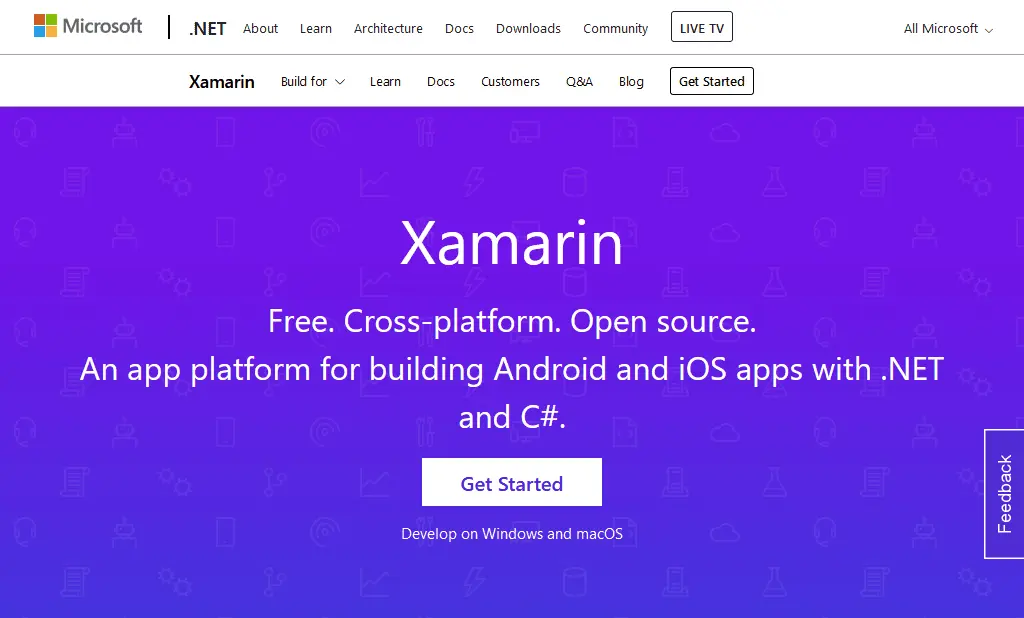
Acquired and enhanced by Microsoft, Xamarin is a free and open-source cross-platform tool for building mobile apps. 1.4 million developers-from indie ones to large app development companies currently use it as their go-to solution for mobile apps. With almost 90% of code reusability, Xamarin is a force to reckon with.
Search interest data from Google Trends.
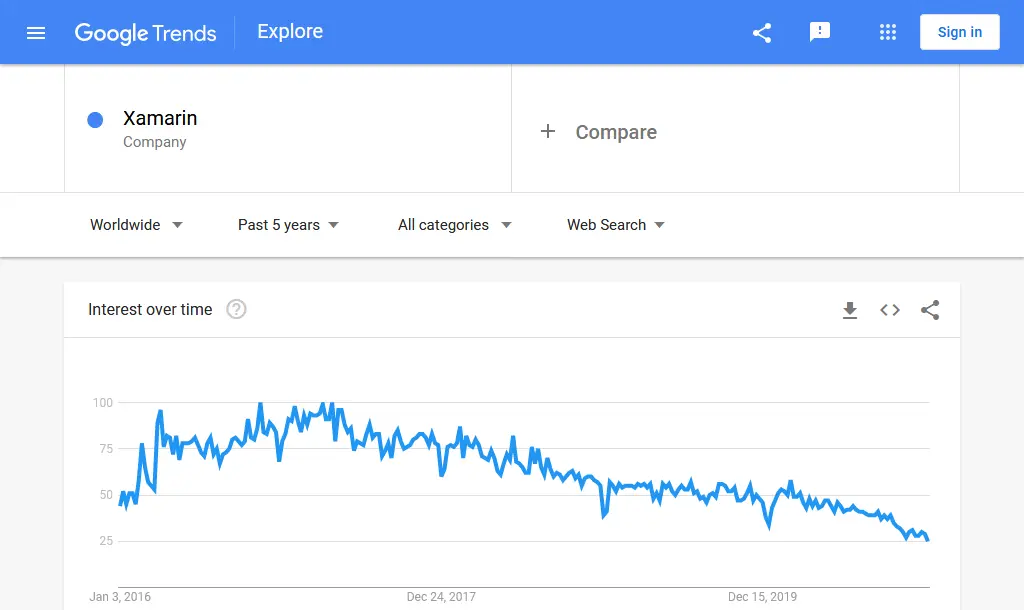
The image above shows the global search interest data of Xamarin for the last five years.
Even though the search volume is on the decline, the native-like feel that you can deliver in the apps built with this tool is of enterprise standard. That’s the reason big businesses and corporations prefer Xamarin.
Pros
Let us have a look at the advantages of Xamarin:
- The C# codebase is compiled to native components of the Android and iOS platforms. Thus, speed and performance are ensured across platforms.
- It comes with robust and meticulous testing capability. This feature drastically lowers the chances of issues occurring later on.
- It gives you access to the cloud testing facility of the Visual Studio App Centre.
- The number of hardware issues is next to zero for apps built with this tool.
- Cross-platform update deployment is easy and fast.
Cons
Xamarin is not free from cons.
Some of those are:
- Xamarin-built apps tend to occupy more device memory compared to native versions.
- Its code cannot be used for HTML5.
- The prototyping feature only supports basic UI elements
- The Professional and Enterprise versions are expensive.
- When using Xamarin. iOS and Xamarin. Android, you would need to be proficient in Objective-C/Swift and Java/Kotlin, respectively, in addition to C#.
Rating
Xamarin has received a 4.4 out of 5.0 based on fifty-five reviews (from g2 review).
The image below shows an extended rating of this tool based on various aspects.
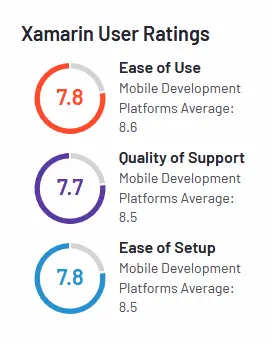
Website: https://dotnet.microsoft.com/en-us/apps/xamarin
2. React Native-A JavaScript-based open-source tool
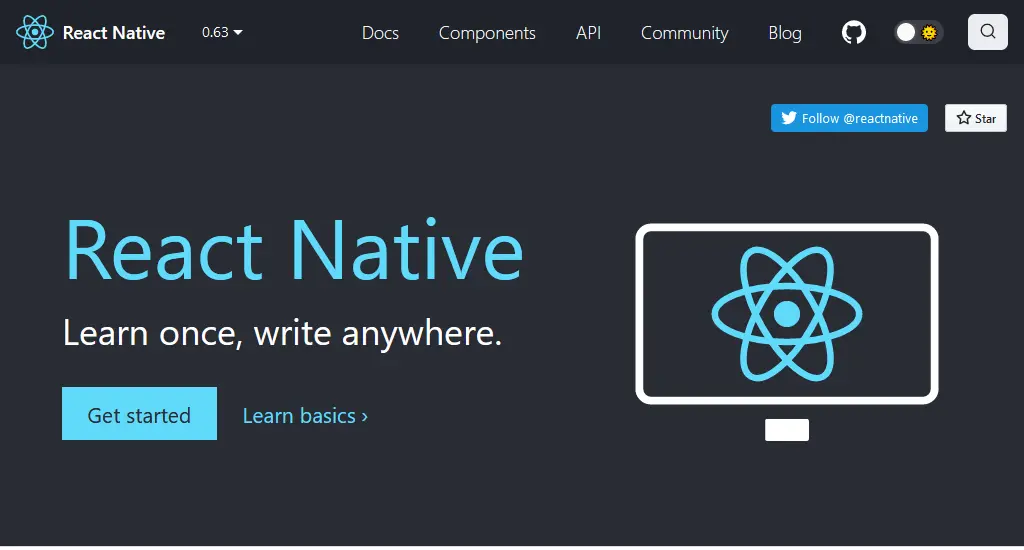
Since Facebook released it in 2015, React Native has managed to secure its place among the tier-1 comprehensive cross-platform app frameworks. No wonder it is in the arsenal of over 40% of mobile app developers, according to a survey by Statista.
Search interest data from Google Trends.
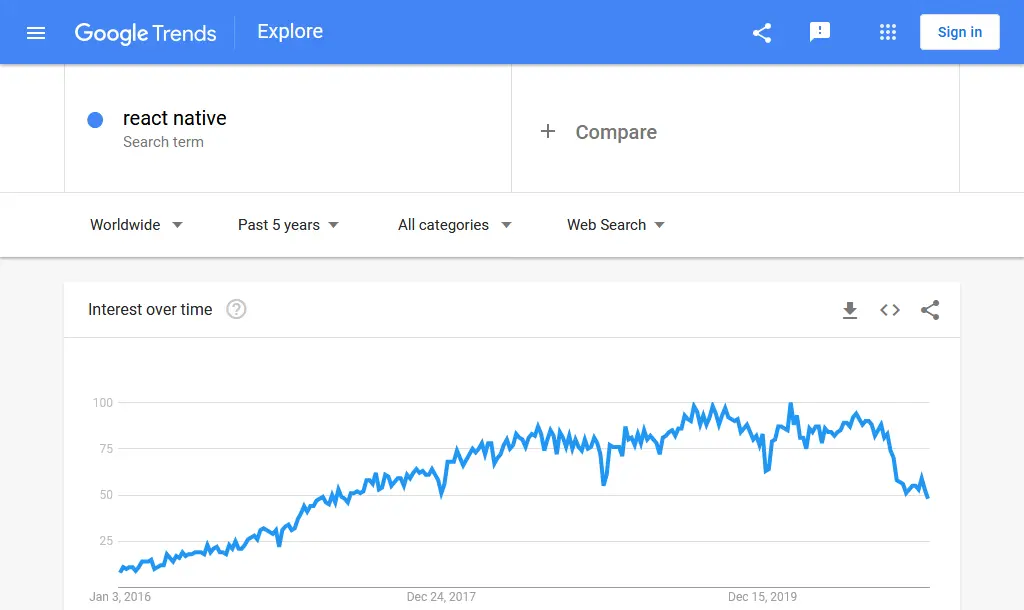
Global search interest data for the last five years correspond to the growing user base of React Native. Businesses catering to a diverse range of customers, such as Bloomberg, Pinterest, UberEats, Wix, Tesla, Walmart, Shopify, Microsoft and Khan Academy, have chosen React Native as their app solution.
Pros
Some of the critical advantages of React Native are:
- It comes with a fast refreshing capability. Thus, any change or update would be deployed across devices with speed.
- It has a significantly high number of GitHub contributors.
- The time to build apps is significantly shorter because of the extensive package ecosystem of JavaScript.
- Over 95% of code for the Android platform can be reused in iOS and vice versa.
- It is a very well-documented platform.
- Allows web developers to develop mobile apps as well because of its JavaScript framework.
Cons
React Native, like Xamarin, has its own set of drawbacks as well.
Some of those are:
- It has a steep learning curve.
- CPU usage when scrolling down is almost twice that of Swift iOS.
- It lacks custom modules.
- Surprisingly, it’s still in beta.
- For complex projects, native platform developers would still be required.
- Since JavaScript is fragile, additional security measures need to be implemented for apps that handle sensitive customer data.
React Native rating
React Native has secured a 4.3 out of 5.0 from forty-four reviews (based on g2 data).
The image below shows a detailed review of this tool.
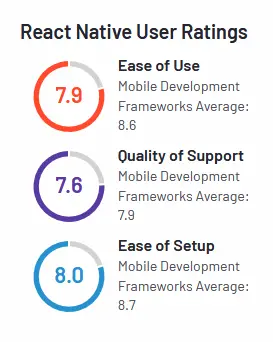
Website: https://reactnative.dev/
3. Flutter-An open-source multi-platform tool

Developed by Google, Flutter is the newest player in the cross-platform mobile app builder arena. It is a C, C++ and Dart-based tool that is quickly gaining traction among development companies and freelancers.
Search interest data from Google Trends.

As you can see, Flutter is gaining popularity fast. This data is consistent with the rising number of stars Flutter is receiving on GitHub.
Pros
Let’s look at some of the benefits of Flutter:
- It has its own set of widgets that make the dual-platform app development process more straightforward.
- Its “hot reload” feature allows you to see any changes you make in milliseconds.
- Installation and configuration of Flutter are simplified, letting you get started faster.
- The same code base is used for both the front and back end of an app. As a result, the development time is significantly reduced.
- Since everything is a widget in Flutter, delivering excellent UX is simplified for both Android and iOS platforms.
Cons
Before you start building mobile apps with Flutter, have a look at its drawbacks:
- Because it’s a new platform, it doesn’t yet have a large community. Thus, resolving issues may be tricky.
- Flutter apps occupy relatively larger memory space and are slower to download.
- Since it’s built with Dart (a new programming language), the learning curve would be higher for developers.
- The evolving nature of this young platform makes writing stable and scalable code difficult.
Flutter rating
Flutter has received a 4.5 out of 5.0 based on seventeen reviews (based on g2 data).
Do have a look at this broken-down review of Flutter in the image below.
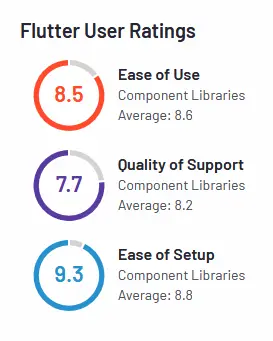
Website: https://flutter.dev/
4. Apache Cordova-A web-dev language-based tool
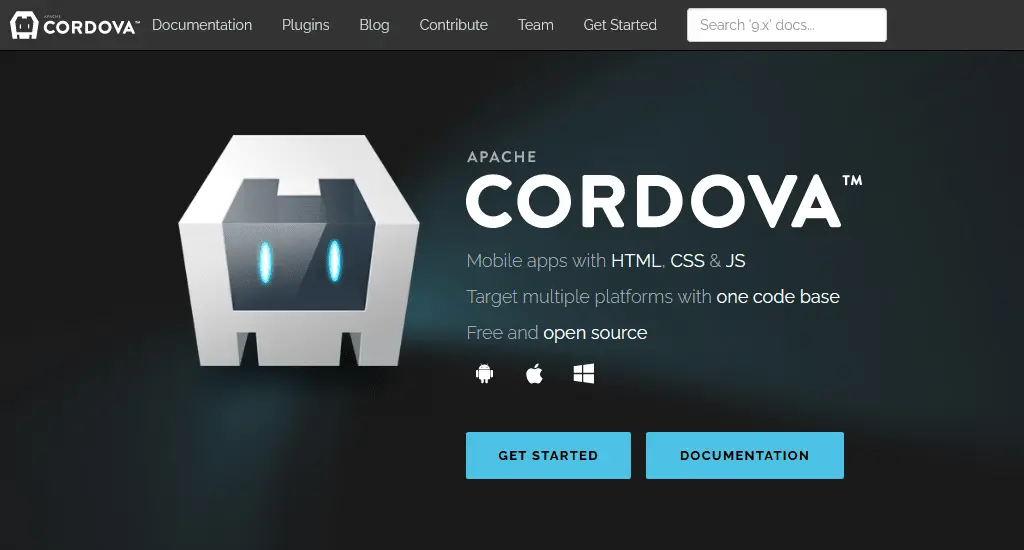
Apache Cordova is an open-source mobile platform app-building tool. You would need to be proficient in languages like HTML, CSS and JavaScript to build iOS and Android apps using this app solution.
Search interest data from Google Trends.
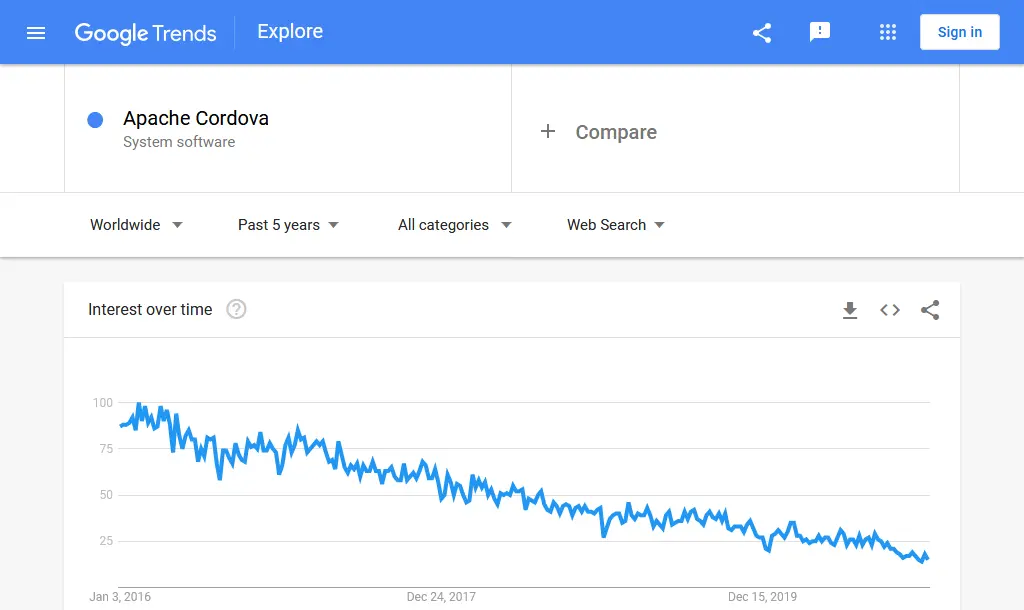
Even though this tool has a declining search interest, it is the preferred multi-platform mobile app solution for about 85% of small businesses.
Pros
Some of the most notable advantages of Apache Cordova are:
- Unlike native apps, it bypasses the operating system update. Thus, apps built by this wouldn’t need upgrades every time a new update of iOS and Android is rolled out.
- If you are a competent JavaScript developer, you will be able to develop multi-platform mobile apps as well, thanks to Apache Cordova.
- It is straightforward to use, i.e. its learning curve would be lower.
- High customizability is one of its top benefits.
- Adding packages to it from third-party repositories such as GitHub is easy for developers.
Cons
- The developer support is not adequate.
- Since it needs the command line, using it for hybrid app development may be complicated.
- There is still room for improvement when it comes to compatibility with mobile machines.
- Its emulators don’t always perform as fast as required.
Apache Cordova rating
It has received a 4.4 out of 5.0 based on thirty-six reviews (from g2 data).
Here is a detailed review to give you a better idea about this tool:
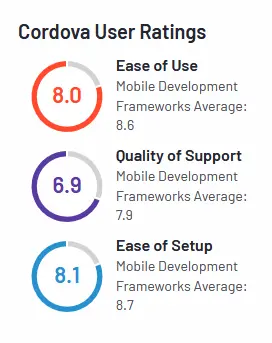
Website: https://cordova.apache.org/
5. Ionic-A JavaScript-based multi-platform app builder
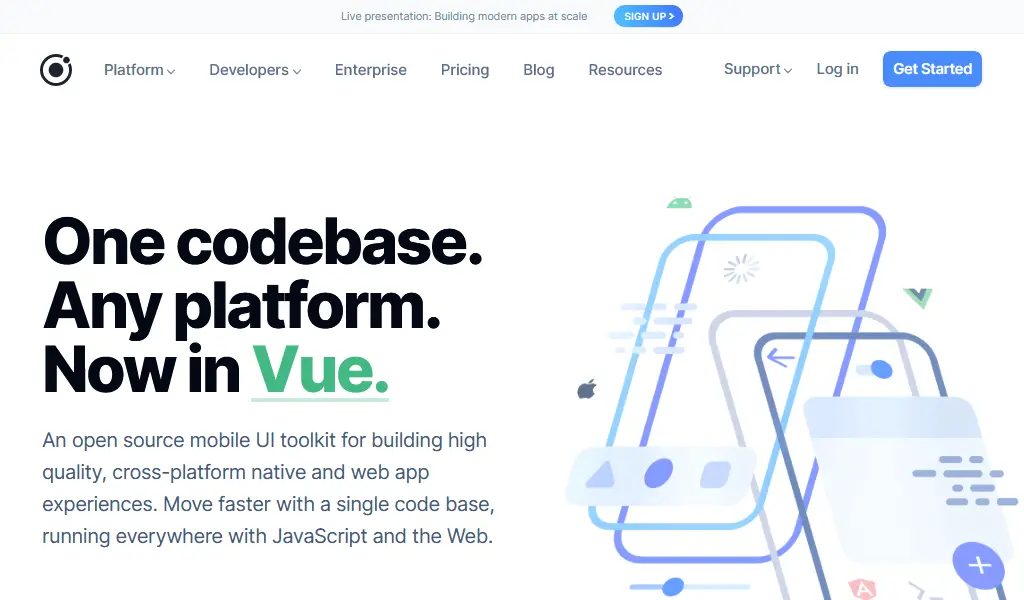
Since its release in 2013, Ionic acquired traction mostly in the US and UK. When it comes to hybrid mobile app development, Ionic is among the top ten frameworks.
Search interest data.
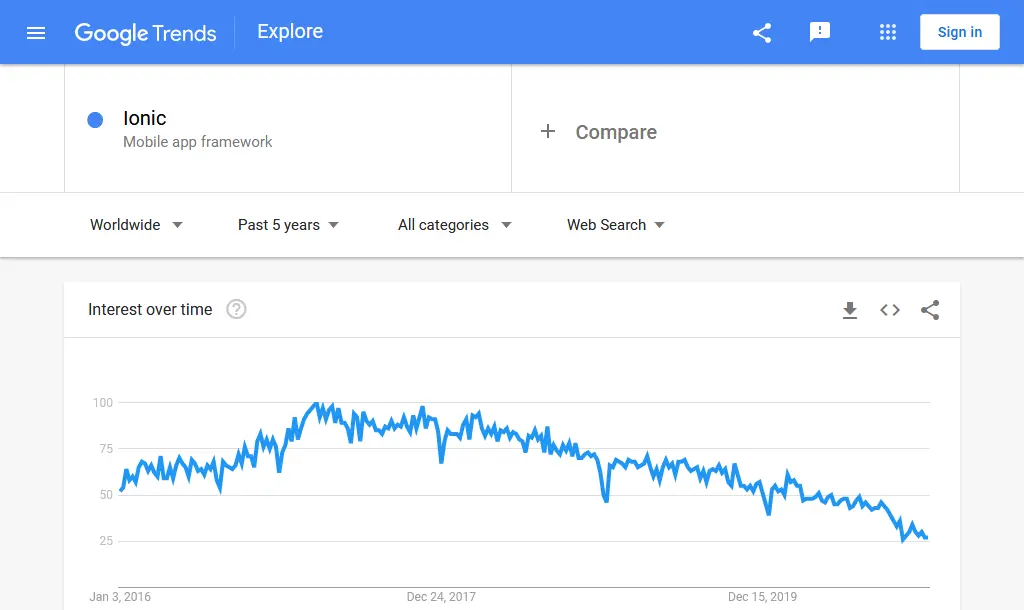
Unlike the other hybrid mobile app builders in this list, Ionic had experienced rising search interest for a couple of years before it started to decline. However, Ionic boldly claims to have powered one-tenth of all apps in the world.
Pros
Let’s look at some of the benefits of Ionic:
- It is capable of integrating with a broad range of technologies. Thus, building complex apps with it is easily manageable.
- Prototyping with Ionic is fast. As a result, the development cost is reduced.
- You would be able to test the apps you build with this tool in your mobile browser. This feature significantly simplifies the testing process.
- The documentation is extensive. Thus, the time taken to resolve issues is lower compared to other platforms.
- It has a strong community of more than five million developers and an active forum. When toying with its components, good advice is always close to you.
Cons
Some of the drawbacks of Ionic you should be aware of are:
- iOS deployment of apps built with this tool is not very easy.
- Some of the community-developed plugins have bugs that are not addressed in a timely fashion.
- The UI doesn’t render very fast because of WebView deployment.
- The functionalities of this tool are less extensive compared to native mobile apps.
Rating
Ionic has received a 4.3 out of 5.0 based on eighty-eight reviews (from g2 data).
Have a look at the extended rating to get a better idea of what other developers think about it.
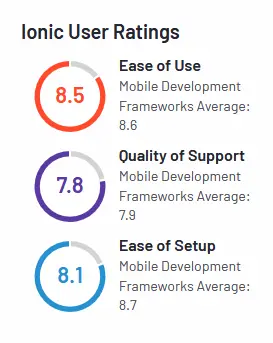
Website: https://ionicframework.com/
6. Appcelerator-A JavaScript-based open-source tool

A multi-platform app development that boasts about one million registered developers, Appcelerator is hard to unheard of. Back in 2013, Business Insider reported that about 10% of all the apps in the world were built with this tool.
Since then, that percentage has grown significantly.
Search Interest data.
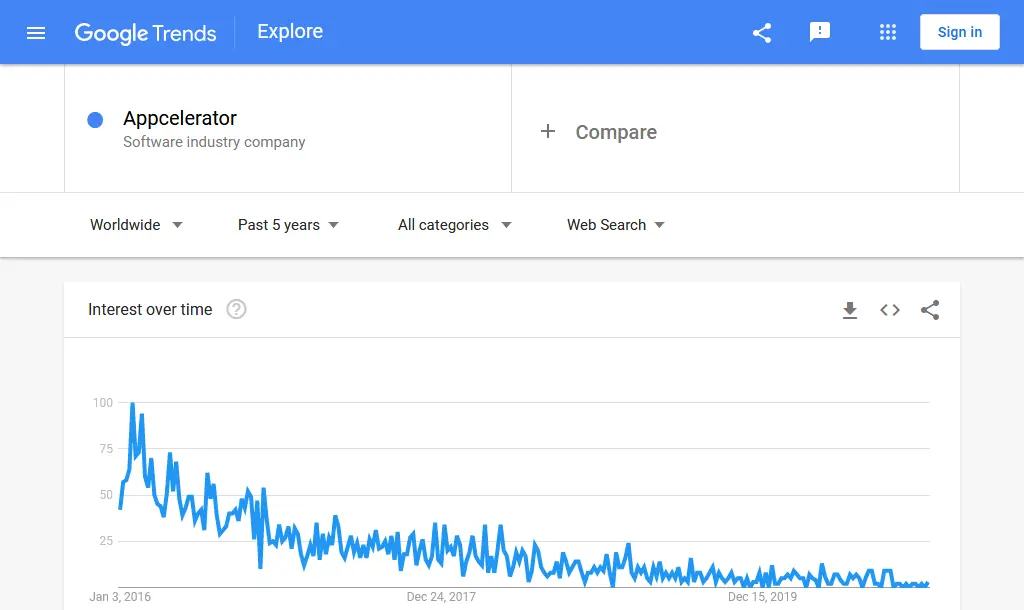
Despite the downward trend in global search interest, Appcelerator has acquired an impressive 5.21% of the cross-platform app development market.
Pros
Benefits of Appcelerator you should be aware of are:
- It offers rich code modules. Because of that, the number of lines of code required would be less.
- Since it’s JavaScript-based, the existing skills of developers can be utilized.
- It lets you use native UI components. Delivering impressive performance is thus relatively more comfortable.
- The interface is intuitive, which catalyzes the app creation process.
- It provides fantastic support to developers. So whenever you face issues (which you will), the tech experts at Appcelerator will help you out.
Cons
Let us cover some of the drawbacks developers have faced while using Appcelerator:
- Apps built with it tend to face memory leakage issues, which usually need to be addressed manually.
- Animations in apps built with it tend to lag. This is something you have to keep in mind if your app is going to be animation-intensive.
- Upgrading to the new SDK would require all old codes to be upgraded as well, which can be complicated.
- UI components are not highly improvised, which raises dependence on external modules.
Appcelerator rating
It has received a 3.9 out of 5.0 based on thirty-nine reviews (from g2 data). Here is the break-down of its rating:
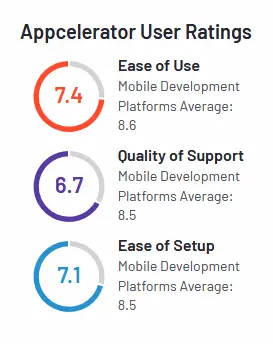
Website: https://www.appcelerator.com/
What are the benefits of multi-platform app development?
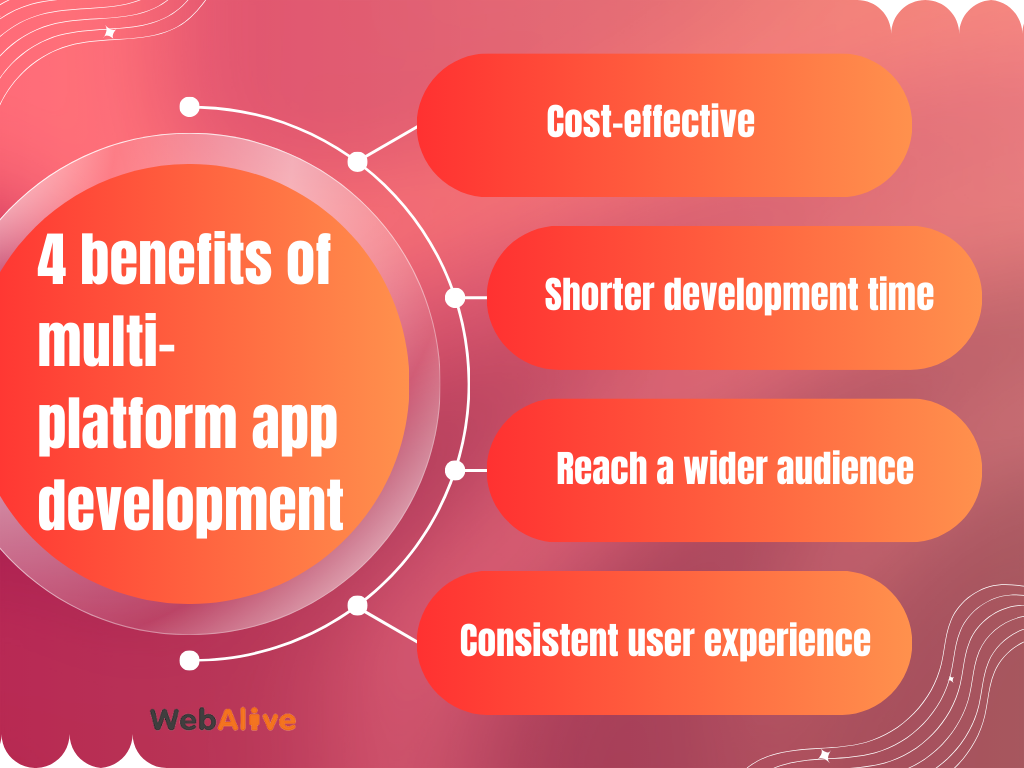
Cost-effective
Cross-platform development uses only a single database, which reduces the overall development cost. Also, since updates, bug fixes and improvements need to be applied only once, the maintenance cost is pretty low as well.
Shorter development time
While working on cross-platform frameworks, companies can significantly cut down on development time. The pre-built components and libraries in the framework let developers integrate elements, animations and features quickly.
Reach a wider audience
Cross-platform development enables companies to target both iOS and Android users by launching a single app. Also, most frameworks allow web and desktop deployment, maximising visibility across multiple devices.
Consistent user experience
Cross-platform frameworks ensure a consistent look and feel across devices. As UI components and styling can be shared across platforms, all the apps remain visually and functionally identical.
Steps to choose the proper cross-platform development framework
If you want to pick the proper framework that best aligns with your business and technical needs, follow the mentioned steps.
- First, check your performance requirements and outline the specific needs. Suppose your app needs high performance; you can choose one with near-native speed.
- Then, identify your team’s expertise and choose the framework that aligns with the team’s skills.
- Compare each framework’s level performance and UI capabilities to understand which one will work best for high performance and native feel or what to choose for quick development and lightweight apps.
- Check whether your app needs access to native features to ensure plugin support.
- Find out whether the framework ensures library access, troubleshooting and future updates.
- Compare maintenance and long-term support alongside the cost and licensing fees.
Native vs cross-platform development: which one to choose
While developing a mobile application, one of the most challenging decisions is to choose between native development or cross-platform development.
If we note down the pros of native development, it includes
- Better performance
- Fully customised user experience
- Access to new features
And the cons are
- Higher development cost
- Lengthy development time
- Complex maintenance
On the other hand, the pros of using cross-platform development are
- Faster development time
- Low cost
- Easy maintenance and updates
- Broader market reach
- Good UI experience
And the cons are,
- Performance limitation
- Limited access to native features
- Potential UI/UX inconsistencies
Considering all these, many business applications and start-ups consider cross-platform development as a practical choice. However, if you are into building a graphic-heavy and feature-rich application, native development is the right option.
A quick recap
Let us go through the cross-platform app development tools we have discussed here:
- Xamarin
- React Native
- Flutter
- Apache Cordova
- Ionic
- Appcelerator
If you have chosen or are already working with one of the above app builders (or any other one), there is one thing you must keep in mind.
Developing amazing apps would require continuous learning and unheard-of experimentation. If you already knew that, great! If you didn’t, well, now you do. I wish you all the very best with your app ideas!
You read a lot. We like that
Want to take your online business to the next level? Get the tips and insights that matter.

